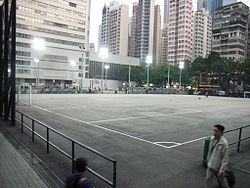Should the Oxfam run guesthouse in Nairobi allow guests to use the swimming pool? That’s the burning question Duncan Green is asking on his popular Poverty to Power blog and he’s asking readers to vote on it. Duncan tells us that it’s closed to limit Oxfam’s reputational risk. What if it got out in the British press? Bad enough in the Daily Mail, but – the horror – imagine if it cropped up in The Guardian?
His post and question are interesting for how they reveal how disconnected your typical aid worker is. And some of the comments only serve to drive this home – they really are worth a read.
My first position with an international NGO was in Hong Kong with International Social Service. I was an immigrant and was hired competitively and on ‘local’ terms – just like all my colleagues, at all levels. Like my colleagues at all levels the bulk of a modest salary went on rent. We worked detention centres for Vietnamese asylum seekers. The environment was usually stressful and sometimes violent. We did our work as best we could, went home at the end of the day and got on with other things. For exercise I played football in Southorn Playground, a municipal football pitch in Wanchai. next door to the 42 storey Southorn Gardens which contained my expensive but tiny shared flat.
Then in 1996 I applied for a job with a European NGO and got posted to Dar es Salaam. Along with a reasonable salary I got housing, transport, food costs covered and driver to take me to the beach for a swim at the end of the day. And I was flabbergasted when I was told I could also have a free maid. My boss was flabbergasted at me being flabbergasted. But he had been in the game then as long as I am now.
The aid business is a very strange world. It sees itself as a world apart, which is self fulfilling. Thinking that yours is a world apart leads to both guilty hand wringing, as seen in Oxfam’s empty pool, and also a deeply unattractive sense of entitlement, as seen in some of the comments on the post.
So, fill the pool, get wet and if people think that’s unacceptable you’ll soon hear about it. Just spare us the hand wringing.



In “Our turn to eat” Michela Wrong recounted a story told to her by John Githongo, who said you could see how quickly a newly elected leader turns corrupt by seeing how soon after their election their wrist bears a new gold Rolex. According to that story, it was three months in Kibaki’s case.
How long does it take a flabbergasted aid worker on their first post on international terms to start protecting rather than questioning their entitlements?
Courageous post with a lot left unsaid. I have several friends, Africa hands, some in the media whose abiding dislike is the aid game- the poverty industry. I have another good friend who has become a millionaire from the poverty industry.. She has stuck largely to DFID and World Bank stuff, has followed the fashions from wmen issues, to micro finance, to value chains and even a bit of open Government, has been doing it for thirty years now and has been happy to follow the wars, Afghan has been a real money maker. Being an aid lady she is very frugal so the consultsancy fees and the per diems have been banked and so levered her up to the first million a few years ago. She has solved her own poverty.
I smile, to me any way to earn a living is as good as any other. But Oxfam worrying about a reputation I am pleased to see exposed.
PS – Sorry, “entitlements” should have had inverted commas.
like
A thought provoking piece which reminded me of A Room with a View:
“There is a certain amount of kindness, just as there is a certain amount of light,” he continued in measured tones. “We cast a shadow on something wherever we stand, and it is no good moving from place to place to save things; because the shadow always follows. Choose a place where you won’t do harm–yes, choose a place where you won’t do very much harm, and stand in it for all you are worth, facing the sunshine.”
You made me want to read this jewel of a book again! Thanks, Anna, for this beautifully appropriate quote 🙂
I’m glad it pleased you 🙂
You’re right. Development and aid professionals are like some kind of sacred cow – “oh don’t deny us our benefits for we are saving lives and doing such wonderful work”….
I once met a girl who was Country Director for a well-known international NGO in Malawi. She told me that her time in that very poor country was the “wealth generation” phase in her life….to acquire money with which to return to the UK to buy a property outright. She was paid a London salary, tax-free, had a house and servants and, yes, the obligatory flashy 4×4. Whilst her Malawian counterparts had to travel on the Matola’s in the dark into pretty unsafe townships for a pittance. She didn’t seem to have a problem with this. I did and still do.
Fantastic post brother.
An interesting post. In the same vein, I am always amazed when I meet aid workers, volunteers or activists who are disappointed and complain about the locals who do not behave…as if the locals were there for the aid worker, not the other way around.
Acutely observed. How ‘swimming pool’ takes up so much oxygen in a blog on ‘power’ and ‘poverty’ is only non-self evident depending on one’s perspective, it seems. For some refreshingly cheeky approaches to the problem, see: http://stuffexpataidworkerslike.com/